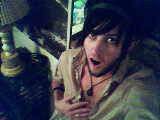
(book I, 304-12)
...she had lived
a sort of cage-bird life, born in a cage,
accounting that to leap from perch to perch
was act and joy enough for any bird.
dear heaven, how silly are the things that live
in thickets, and eat berries!
i, alas,
a wild bird scarcely fledged, was brought to her cage
and she was there to meet me. very kind.
bring the clean water, give out the fresh seed
1) how does the metaphor of the bird work in this passage? (clue: what two things are being compared and how are they alike? women and birds. first discuss how the aunt is like a bird, and second how aurora is like a bird.)
as the question sort of answers itself, 2 things being compared in this excerpt are women (aurora and her aunt) and birds (cage bird and free bird). the aunt is like a bird in that she is content to spend her life cooped up (i.e. in a cage) like a bird, rather than go out and really experience culture and the world.
as aurora lands in england after the death of her father, she sees her father's sister standing outside of her house,
"...straight and calm,
her somewhat narrow forehead braided tight as if for taming accidental thoughts
from possible pulses..."
the aunt has trained herself to be restrained and conservative and dutiful at all times. she is a caged, civilized, christian bird, and she's fine w/ it. it's also interesting that the aunt is never given a name, further suggesting how impersonal she is towards aurora.
as for aurora, she can also be considered to be a bird, but more wild and free than her aunt. she wants to "spread her wings," if you will. however, her aunt views aurora as a wild italian tuscan girl that needs to be taught manners, modesty, hard work, etc. since she is still so young at the time she moves in w/ her aunt, the aunt feels she has the opportunity to undo the progressive ideals instilled in her. however, aurora doesn't think that people should be "tamed." the term "fledged" applies to birds whose wings are clipped to prevent them from being able to fly.
2) what does this passage say about the relationship b/t aurora and her aunt? what can we infer from this passage to make sense of how aurora views her idea of femininity as it relates to the womanhood her aunt presents?
this passage illustrates the conditional love b/t aurora and her aunt. when aurora writes "very kind," it sounds less than authentic, as if the reader is supposed to acknowledge that this is sarcasm. the short staccato sentence suggests this further. later, on pg. 14, she writes,
" 'she(her aunt) loved my father and would love me too
as long as i deserved it.' very kind."
at this point, the reader knows that her aunt is basing her love for aurora off a failed ideology of british conservatism during the height of the victorian age of manners. it also shows a flawed side of the aunt, who selfishly wants to change aurora so she is less and less like her dead mother, who the aunt did not approve of. it seems the aunt quit loving her brother (aurora's father) once he left for italy and became immersed in culture and his love affair.
aurora's view of femininity do not align w/ her aunt's. she has no desire to do house chores, dressing properly, etc. aurora is a free spirit. the womanhood her aunt presents is a reserved kind. aurora has no interest in this type of housewife womanhood career. she wants to make money through her writing, regardless of w/e plans her aunt might have for her.






